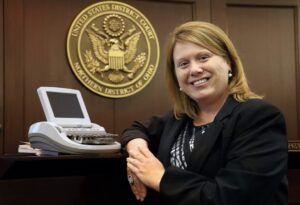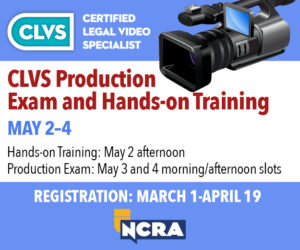In a positive development for recent graduates of court reporting programs in Michigan, the Michigan Court Reporting and Recording Board of Review has amended its rules regarding temporary court reporting certification. The updated rules will allow for students who recently graduated from a court reporting program to work as a freelance court reporter while waiting to pass the next available RPR exam. Previously, recent graduates were unable to work in Michigan at all until they passed their RPR, forcing many qualified reporters to leave the state prior to obtaining their certification.
The Michigan Association of Professional Court Reporters spent months working with the State Court Administrative Office and the Court Recording Board of Review to reverse this decision and allow qualified graduates from court reporting schools to work while obtaining their certification. In October 2013, NCRA President Nancy Varallo submitted a letter to the Michigan Court Reporting and Recording Board of Review supporting MAPCR’s position and urged the board to “reverse the decision which would deny temporary licenses to court reporters who have recently graduated from court reporting programs and schools.”
The following is a summary of the new rules provided to NCRA by MAPCR:
Effective immediately, graduates of an approved, accredited course of study in court reporting are eligible for a temporary certification under the following conditions:
- They must supply the SCAO with a diploma or certificate from the course of study.
- They must be registered for the next available RPR Exam (and SCAO must receive confirmation of registration from the NCRA).
- They must be employed by a firm that has been approved by the Board for purposes of hiring temporarily certified reporters.
- They are restricted to deposition work only and cannot take the record of court proceedings until they are fully certified.
- They must utilize digital stenographic equipment equipped with real time software and audio backup. A copy of the audio backup must be provided to the employer after each deposition.
In addition, the board may extend the temporary certification if the applicant has passed two legs of the RPR Skills Test.
In response to the board’s announcement, MAPCR issued a statement praising the board’s decision.
“Through the assistance of NCRA President Nancy Varallo, MAPCR President Melinda Dexter, and 2013 NCRA Teacher of the Year Sharon Kandt, students, firm owners, and working reporters, we are happy to report the positive change in Michigan’s temporary certification. MAPCR would like to especially thank Denise Kizy and Felicia Jordan for all their dedication and service on the Michigan Court Reporting and Recording Board of Review representing the professional court reporters and students in Michigan. This wasn’t an easy task, but one that they were able to accomplish because of their passion and professionalism in convincing a very reluctant Board to make the positive changes that were needed.”









